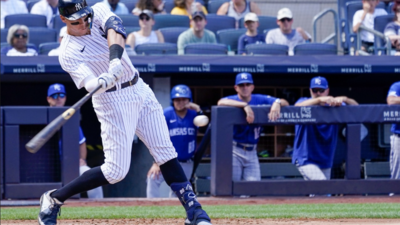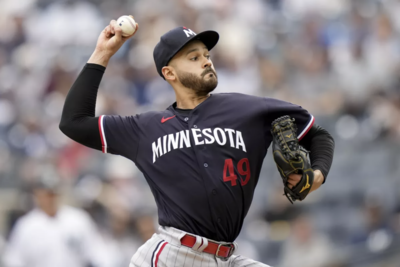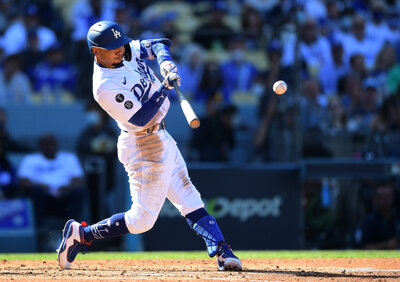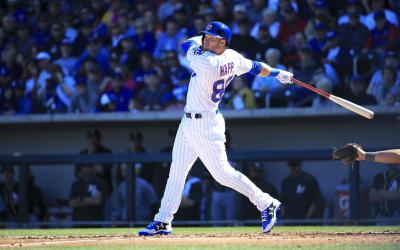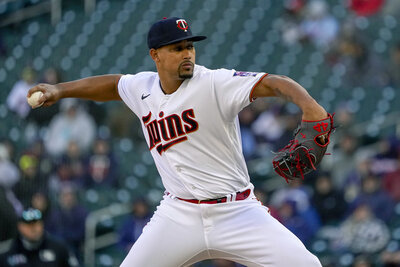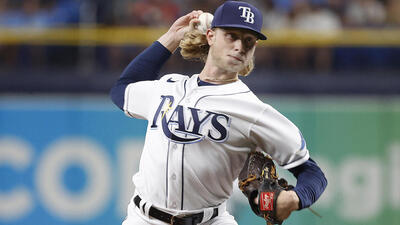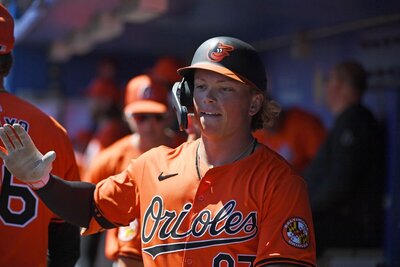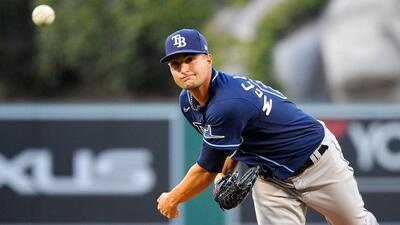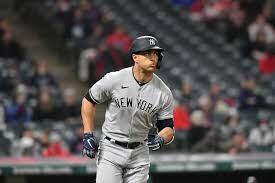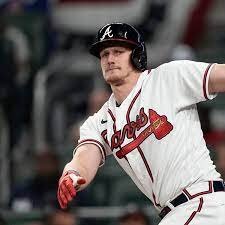Regular subscribers to Insiderbaseball.com know all about how I feel about starting pitching.
No matter how good any given hitter is, even at a scare position, he's still just 1- of -14 hitters in most formats. An elite SB guy can have a huge impact on that column of course but that's one column, and for the most part, it takes more than one great hitter to be competitive overall in your league offensively. You can't even be overly competitive with 5 strong hitters and a bunch of Kevin Millars. No, competitive offense is a 1-to-14 proposition, sometimes 1-to-15 or more over the course of a season.
On the pitching side, if your league scores Saves you can get 1, 2, or 3 contributors and be strong in that column, but those guys will be hard pressed to make a significant positive contributions to the rest of the pitching columns as the innings they contribute to the equation will be dwarfed by those posted by the starters.
Those pitching columns, by the way, are 50% of your scoring in most leagues. Your typical league scores Wins, ERA and WHIP. Some score Losses or Strikeouts in some form. All of those columns will be dominated, for better or worse, by your starting staff. In most leagues that is 5 or 6 starting pitchers. That means a handful of players will dominate most if not all of 50% of your scoring.
On offense it takes 14 guys. But in the other half of your columns much of the burden falls on just 5 or 6 guys.
Add to that the fact that every pitcher is one pitch away from the end of his season at all times, and add to that the fact that pitching is about as easy to predict as a New England March day, and you begin to understand that any success or failure in terms of staffing your starters, any good or bad luck, goes more directly to the hips of your fantasy team than almost any other 5 guys on your team.
In summary your starters are the most crucial part of your team. And the decision you make on which 5 or 6 guys will be your starters this year may determine the outcome of your season more directly than any other.
Another important principle to grasp at this point is that a fantasy pitching staff is interactive and woven as opposed to collected. It does no good to pay a lot of money for Johan Santana to throw seven shutout innings for you when you have Bruce Chen as your #5 starter giving up 5 runs in 3 IP ...That's a pretty mediocre 4.50 ERA collectively and Chen just turned your high ticket ace into a middle of the road pitcher.
If you allowed this to happen you allowed Bruce Chen to determine your fate, not Johan Santana.
On offense a bad hitter, aside from a small ding in batting average simply doesn't help your numbers, but on the pitching side a bad pitcher actually hurts your numbers. It's important to have a few better-than-average starters (they are expensive) and fill out the rest of your team with pitchers that will give you simply "average"numbers in support of your better pitchers. Getting stuck with bad pitchers can easily negate the cost of acquiring your better pitchers,
In addition to collecting one or two "offensive"starters (pitchers who actually improve your staff's overall numbers when they start, usually elite starters who come at elite prices) and one or two "defensive"starters (high QS% pitchers who consistently give you an effort that at minimum will not undo the good work that your offensive starters do .. starters that just don't get bombed too often) it is important to get an undervalued starter or two so that you can use the extra money to make sure you get that second offensive starter.
And in keeper leagues you need to occasionally jump early on a top prospect or otherwise risky player because that's the time when you can get them at an advantageous price.
So you should be willing to pay a premium for a true "offensive"starter or two and you should be very careful to not pay more than market value for your "defensive"starters because there are enough to go around. But you need to land one or two value starters, pitchers who will return more than you pay for them and who have some ceiling. Here are the guys that will probably fit that bill in your league. Â
Lets look at some of the pitchers who we project will be worth significantly more this year than they were last year. Most of these will be either veterans rebounding from a sub-par year due to injury or emerging kids. Some will be pitchers who appear ready to find the next level. Many will be a bit undervalued in your league and it is important to identify at least some starter targets that will return more than you pay for them.
Daisuke Matsuzaka +$28
That I essentially start out the 2007 season by writing an item about Daisuke is poetic justice. It allows me to say for the first time this year that ... well ... I really have very little idea what's going to happen with this guy ... There, that felt good ... Fantasy baseball writers feel that all the time. Every once in a while I like to say it aloud. But hey I certainly have my opinions.
First I basically throw out his Japanese stats. I've seen Japanese baseball, and I have trouble believing that it's particularly relevant to MLB. And I have seen Matsuzaka pitch including in person at the WBC. I put a little more weight in that. What I think I saw was a pitcher with at least 4 identifiable plus pitches. I saw velocity in his fastball but I fear there will be movement issues with it. Fortunately Matsuzaka pitches in reverse and he will use his offspeed stuff to set up his #1. The best of that offspeed stuff is a plus, plus change which always gives me confidence in a pitcher.
He's going to be good, very good, and well worth a strong investment in keeper leagues. But he probably won't realize that top potential in 2007. He has to adjust to the culture (so far he seems less phased in that regard than most Japanese imports) and to Boston (again, that doesn't seem to be an issue to this point), and perhaps most importantly to lineups such as the Yankees, the likes of which he probably only has only seen on Playstation 3. he has the stuff to make it work and of course those lineups will need to do some adjusting to him as well.
We are projecting 16 wins, a 3.23 ERA and a 1.27 WHIP. Everyone would be very happy with that in 2007 and that's the kind of performance you'll have to pay for. The reality is however that you probably will get something slightly less than that this year, although there's a good chance you'll get better in the long term. Hence the rub.
In keeper leagues you don't get many cracks at pitchers with Matsuzaka's capabilities and potential. You have to take the risk.  Â
Â
Ben Sheets +$23
Ben Sheets is a proven pitcher who could do great things if he could produce 30 starts in a season. The problem is that he hasn't done that since 2004. Given his health problems last year his indicators were impressively solid. No less impressive was his second half in which he made 13 starts with a 3.15 ERA and a .241 OBA. His health issues (lat and shoulder tendonitis) aren't generally degenerating or career threatening. A little luck and an injury free stretch will return him to the elite of MLB starter. Unfortunately for us we can't forecast luck in regards to injury. Wins are always a bit thin with Ben as well. We project 176 IP with 13 wins, a 3.44 ERA and a 1.10 WHIP
Rich Harden +$23
See Ben Sheets ... Once again, this pitcher performed well when able. The only peripheral that suffered in his small 46 IP sample from 2006 was his walk rate but there was nothing in his curtain call that indicates his elbow issues have sapped his potential. Unlike Sheets however, Rich's elbow issues are worrisome in the long term. In an AL context Harden can be a top half of the rotation starter but it's folly at this point to bank on more than 20 starts from him. The fact that that particular doubt should linger for a while means that he's even riskier in keeper leagues. Our projections however look for 200 IP with 18 wins, a 3.30 ERA, and a 1.24 WHIP. If that 1.24 WHIP is accurate the other numbers would be hard to attain. I'd be very happy with 14 wins and a 3.60 ERA. Of course what would really make me happy as a Harden owner myself is the projected 200 IP. I figure the rest will take care of itself.
Cole Hamels +$17
Cole's OBA, strikeout rate and walk rate in his MLB debut last year promised better results than he was getting for most of the summer. In September we saw a bit of that promise as Hamels went 2-1 in 5 starts with a .214 OBA and a 2.78 ERA. There's still plenty of upside here as Cole has just topped 300 pro IP. He has some weird back issues including a questionable disk and an unfused vertebrae but Hamels is reportedly blessed with a remarkable work ethic and he's nearly religious about a back stabilizing program. All of that and his strikeout rate and control make him an enticing, emerging starting star. I'm excited to see what waits down the road for this one, but his freaky health issues, the dreaded sophomore slump, and Citizen's bank give me pause for 2007. He gave up 19 HRs in 132.1 IP last year due in large part to his 0.97 GB/FB ratio. That also produced a larger-than-totally-comfortable .426 OSLG%. As the "book"gets thicker on Cole it's possible he gives up more contact and in Citizens Bank he'll need to keep the ball on the ground more. Right now that may be nitpicking. Cole appears headed for the top shelf of MLB starters and everyone knows it even if he doesn't quite get there in 2007. He won't be bargain this year. We are projecting 14 wins a 3.71 ERA and a 1.19 WHIP in 192 IP.  Â
Adam Wainwright +$14
Adam quite literally saved the Cards after Jason Isringhausen went down with hip surgery. He finished last year as the Cardinals closer on the biggest stage in the game. His minor league history is nothing to get terribly worked up about. In 2005 he allowed 204 hits in 182 IP for AAA Memphis along with 51 walks (1.40 WHIP) with 147 Ks. And that was his 5th pro season. Last year in 61 relif appears in the big leagues he gave up just 64 hits in 75 IP. He still walked 23 (a paltry 1.16 WHIP) and he struck out 72. He also posted a slick 1.50 GB/FB ratio which is going to have to be his ticket as a starter for the Cards this season. Adam is pitching in the right state as far as I'm concerned. He has to show me that he can sustain his effectiveness in 6-7 innings spans while going through the lineup 2-3 times. Last year his OBA in pitches 1-15 was .218 but in pitches 16-30 it was .276. I like his potential as a starter but I have to see him be effective before I am ready to get too excited. We are projecting 14 wins in 191 IP this year with a 3.53 ERA and 1.27 WHIP. That's well within his capabilities but I can also envision scenarios where he could struggle. If it turns out he leaves Florida as a reliever his stock goes up, but if he starts the year as a starter you need to be just a bit skeptical.  Â
See member section for the complete analysis on all the Starting Pitchers who are expected to increase in value this year.




